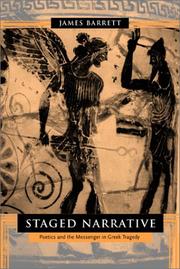| Listing 1 - 3 of 3 |
Sort by
|
Book
ISBN: 1280578548 9786613608291 144112490X 9781441124906 9781441152855 1441152857 9781441107992 9781441198242 9781280578540 6613608297 9781472540119 1472540115 1441198245 9781441198242 Year: 2012 Publisher: London Continuum International Pub.
Abstract | Keywords | Export | Availability | Bookmark
 Loading...
Loading...Choose an application
- Reference Manager
- EndNote
- RefWorks (Direct export to RefWorks)
Described as the Mona Lisa of literature and the worlds first detective story, Sophocles' Oedipus the King is a major text from the ancient Greek world and an iconic work of world literature. Aristotles favourite play, lauded by him as the exemplary Athenian tragedy, Oedipus the King has retained its power both on and off the stage. Before Freuds famous interpretation of the play an appropriation, some might say Hlderlin and Nietzsche recognised its unique qualities. Its literary worth is undiminished, philosophers revel in its probing into issues of freedom and necessity and Lacan has ensured
Book
ISBN: 0472121081 0472901079 0472119567 9780472901074 9780472121083 Year: 2015 Publisher: Ann Arbor : University of Michigan Press,
Abstract | Keywords | Export | Availability | Bookmark
 Loading...
Loading...Choose an application
- Reference Manager
- EndNote
- RefWorks (Direct export to RefWorks)
"Only a few plays by Sophocles--one of the great tragic playwrights from Classical Athens--have survived, and each of them dramatizes events from the rich store of myths that framed literature and art. Sophocles' treatment evokes issues that were vividly contemporary for Athenian audiences of the Periclean age: How could the Athenians incorporate older, aristocratic ideas about human excellence into their new democratic society? Could citizens learn to be morally excellent, or were these qualities only inherited? What did it mean to be a creature who knows that he or she must die? Late Sophocles traces the evolution of the Sophoclean hero through the final three plays, Electra, Philoctetes, and Oedipus at Colonus. The book's main thesis, that Sophocles reimagined the nature of the tragic hero in his last three works, is developed inductively through readings of the plays. This balanced approach, in which a detailed argument about the plays is offered in a format accessible to nonspecialists, is unusual--perhaps unique--in contemporary Classical scholarship on Sophocles. This book will appeal to nonspecialist readers of serious literature as well as scholars of classical and other literatures. While including ample guidance for those not familiar with the plays, Late Sophocles goes beyond a generalized description of "what happens" in the plays to offer a clear, jargon-free argument for the enduring importance of Sophocles' plays. The argument's implications for longstanding interpretational issues will be of interest to specialists. All Greek is translated." --
Sophocles --- Sophocles. --- Criticism and interpretation. --- Sofokles --- Sophocle --- Sofocle --- Sophokles --- Sofocles --- Carter, Elliott, --- Sófocles --- Sofoklis --- Sofokl --- Sūfūklīs --- Sūtmūklīs --- Sofokŭl --- סופוקלס --- سوفوكليس --- Σοφοκλῆς --- Literary Criticism / Ancient & Classical --- Literature --- History and criticism --- Appraisal of books --- Books --- Evaluation of literature --- Criticism --- Literary style --- Appraisal --- Evaluation --- Classics --- Clytemnestra --- Electra (Sophocles play) --- Neoptolemus --- Odysseus --- Oedipus Rex --- Orestes (play) --- Philoctetes (Sophocles play) --- Theseus

ISBN: 0520231805 0520927931 9786612356582 1282356585 159734916X 9780520927933 0585419647 9780585419640 9780520231801 9781597349161 6612356588 9781282356580 Year: 2002 Publisher: Berkeley University of California Press
Abstract | Keywords | Export | Availability | Bookmark
 Loading...
Loading...Choose an application
- Reference Manager
- EndNote
- RefWorks (Direct export to RefWorks)
The messenger who reports important action that has occurred offstage is a familiar inhabitant of Greek tragedy. A messenger informs us about the death of Jocasta and the blinding of Oedipus, the madness of Heracles, the slaughter of Aigisthos, and the death of Hippolytus, among other important events. Despite its prevalence, this conventional figure remains only little understood. Combining several critical approaches-narrative theory, genre study, and rhetorical analysis-this lucid study develops a synthetic view of the messenger of Greek tragedy, showing how this role illuminates some of the genre's most persistent concerns, especially those relating to language, knowledge, and the workings of tragic theater itself. James Barrett gives close readings of several plays including Aeschylus's Persians, Sophocles' Electra and Oedipus Tyrannus, and Euripides' Bacchae and Rhesos. He traces the literary ancestry of the tragic messenger, showing that the messenger's narrative constitutes an unexplored site of engagement with Homeric epic, and that the role illuminates fifth-century b.c. experimentation with modes of speech. Breaking new ground in the study of Athenian tragedy, Barrett deepens our understanding of many central texts and of a form of theater that highlights the fragility and limits of human knowledge, a theme explored by its use of the messenger.
Greek drama (Tragedy) --- Messengers in literature. --- Narration (Rhetoric) --- Rhetoric, Ancient. --- History and criticism. --- History --- -Messengers in literature --- Rhetoric, Ancient --- Classical languages --- Greek language --- Greek rhetoric --- Latin language --- Latin rhetoric --- Narrative (Rhetoric) --- Narrative writing --- Rhetoric --- Discourse analysis, Narrative --- Narratees (Rhetoric) --- History and criticism --- Tragédie grecque --- Messagers dans la littérature --- Narration --- Rhétorique ancienne --- Histoire et critique --- Ancient rhetoric --- Messengers in literature --- achilles. --- aeschylus. --- ancient greece. --- ancient world. --- arete. --- athenian tragedy. --- bacchae. --- classicism. --- drama. --- electra. --- epic. --- epistemology. --- euripides. --- genre study. --- gods and goddesses. --- greek tragedy. --- hellenism. --- homer. --- homeric epic. --- hubris. --- human knowledge. --- literary ancestry. --- literary criticism. --- literature. --- messenger. --- mythology. --- narrative poetics. --- narrative theory. --- nonfiction. --- oedipus rex. --- oedipus tyrannus. --- oedipus. --- performing arts. --- persians. --- poetry. --- rhesos. --- rhetoric. --- rhetorical analysis. --- sophocles. --- theater. --- tragedy. --- tragic messenger.
| Listing 1 - 3 of 3 |
Sort by
|

 Search
Search Feedback
Feedback About UniCat
About UniCat  Help
Help News
News